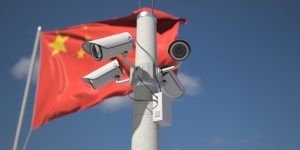The Diplomat author Mercy Kuo regularly engages subject-matter experts, policy practitioners, and strategic thinkers across the globe for their diverse insights into U.S. Asia policy. This conversation with Josh Chin ̶ deputy bureau chief in China for The Wall Street Journal and co-author of newly published “Surveillance State: Inside China’s Quest to Launch a New Era of Social Control” (2022) – is the 338th in “The Trans-Pacific View Insight Series.”
Describe the core characteristics of China’s surveillance state.
The Chinese surveillance state uses vast quantities of data and cutting-edge artificial intelligence to build a nimbler form of authoritarianism that’s capable of exercising unprecedented social control. With enough data and the right tools, Chinese leaders believe they can predict threats and problems before they even arise. The ultimate goal is a perfectly engineered society that automatically neutralizes dissidents while rewarding those who comply with lives of convenience, safety, and predictability.
Examine the relationship between the Chinese state and industry in systemizing social control.
China’s tech industry has been absolutely critical to the ability of the Communist Party to expand and hone its control over Chinese society. Internet giants like Alibaba and Tencent control troves of behavioral data that Silicon Valley companies can only dream of, and they share it far more readily with the government. In its hometown of Hangzhou, Alibaba built a cloud platform called the City Brain that manages a bunch of critical functions, from traffic to electricity usage to healthcare delivery.
Recently, Chinese leader Xi Jinping has hammered the internet companies with new regulatory controls to try to bring them even closer to heel. The question now is what effect that crackdown will have on the innovation that has made the companies such valuable partners for the state.
How has China democratized state surveillance around the globe?
The greatest barrier to the spread of state surveillance in the past has been money. Tracking large numbers of people required paying large numbers of people to spend countless hours operating expensive equipment. Much like they did with drones and telecom equipment, Chinese technology companies have made state-of-the-art surveillance systems affordable and accessible. They have also been happy to arrange favorable loans to governments interested in buying Chinese tracking technology. Research by Sheena Greitens at the University of Texas shows Chinese police surveillance systems being sold to more than 80 countries around the world, including several democracies. Chinese tech companies themselves say they have sold their products much more widely than that, though we haven’t been able to verify those claims.
Explain the concept of “Panopticon and Potemkin AI.”
Grigory Potemkin was a Russian statesman who gussied up the villages under his control in order to fool Catherine the Great into thinking they were prosperous. “Potemkin AI” is a phrase coined by surveillance researcher Jathan Sadowski to refer to tech products that portray themselves as being much “smarter” than they actually are. One example he cited was M, a now defunct virtual assistant that Facebook launched in 2015, which turned out to be run partly by humans.
A lot of the AI involved in the Chinese surveillance state is similarly deceptive. Chinese state media is full of stories of lost children being found through facial recognition that turn out to be exaggerated or completely made up. But in a sense, it doesn’t matter. What matters for the Communist Party is that people “believe” the technology works. It’s the same dynamic that the British social theorist Jeremy Bentham famously exploited in creating the panopticon, a circular prison based on designs that his brother conjured while working on one of Potemkin’s villages. The guard in the central tower can only watch so many prisoners at any given time, but the building is designed in such a way that every prisoner has to assume he or she is being watched all the time.
Assess the geopolitical and geoeconomic impact of China’s surveillance state on competition between autocratic and democratic nations.
The Chinese surveillance industry has exported its products to dozens of countries on every continent except Australia and Antarctica. In some cases, the Chinese government offers training to foreign police forces in how to use the systems they’re buying. These tools make it easier for autocratic leaders to stay in power. In countries where democratic institutions are weak, incumbent leaders can use them to establish de facto authoritarian regimes under the guise of crime-fighting – as Yoweri Museveni has done in Uganda using a surveillance system purchased from Chinese tech giant Huawei.
The challenge to advanced democracies, particularly amid the global democratic recession, is immense. China offers a clear vision for how states should make use of these technologies. Democracies, meanwhile, are struggling to put forth an alternative. The European Union has clearly decided to put privacy first and is considering an outright ban on real-time digital surveillance. But the U.S. is mired in confusion, with individual states adopting a grab bag of approaches. Americans helped create the global market for digital surveillance with the War on Terror. Where things go from here likely depends on their willingness to confront this latest evolution in tracking technologies.

































